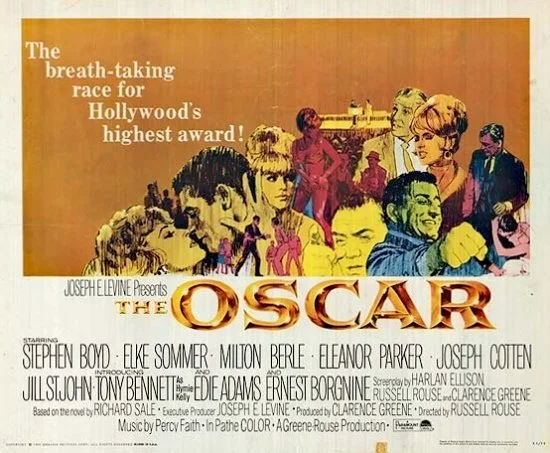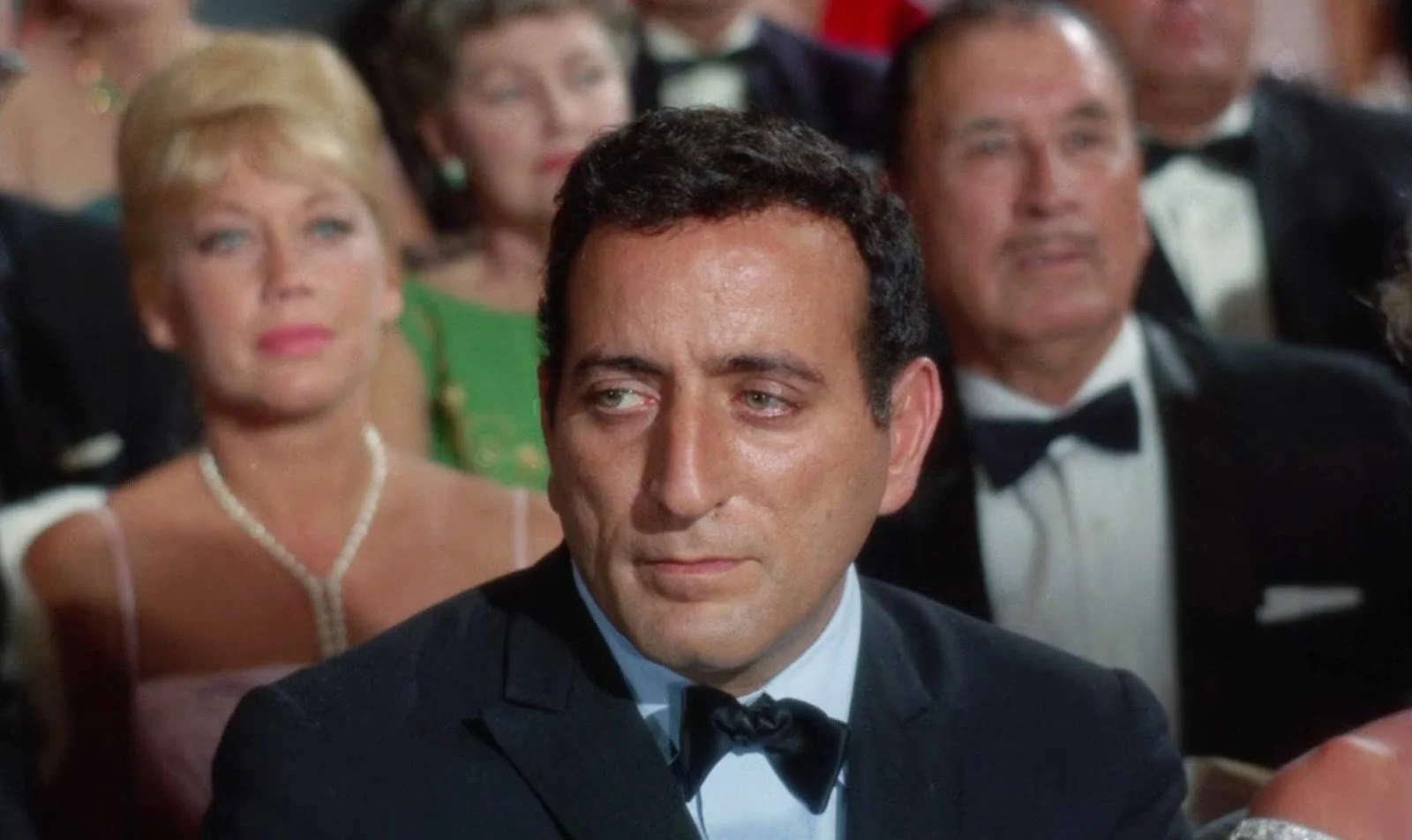There Are Probably Better Ways to Honor The Great Tony Bennett Than By Re-Running This Piece on His Terrible Performance in The Oscar But That's the One We're Going With
The promise of the Internet, and Youtube in particular, is that seemingly nothing in our world is ever conclusively lost, and that seemingly the sum of human endeavor is readily accessible through a simple Google search. That wasn’t the case when the legendary Canadian sketch comedy troupe SCTV was delighting a small but appreciative cult following with elaborate, sometimes episode-long parodies of pop culture ephemera that had already been half-forgotten if people even bothered to pay attention to it in the first place.
In that respect the 1966 show-business melodrama The Oscar, which SCTV lovingly and extensively parodied as The Nobel, is perfect SCTV fodder: semi-obscure but not completely unknown, wildly over the top in a deliciously unselfconscious way and absolutely obsessed with the pretension and ridiculousness and hypocrisy of show-business. More than anything, however, The Oscar is bad in a way that angrily demands to be parodied.
The flamboyant, historic awfulness begins with opening credits promising a cast for the ages. Where else are you going to find Milton Berle, Nancy Sinatra, Joseph Cotten, Ernest Borgnine, Broderick Crawford, Edith Head, Jill St. John, Elke Sommer, Hedda Hopper, Peter Lawford, Bob Hope and Frank Sinatra in a movie co-written by legendarily cranky science-fiction writer Harlan Ellison?
The Oscar has some amazing, unlikely, gloriously preposterous credits, like costume guru Edith Head being billed as both an actress (playing herself) and a costume designer, but the most amazing, unlikely and gloriously preposterous credit is undoubtedly the exquisite “Introducing Tony Bennett as Hymie Kelly.”
The man born Anthony Dominick Benedetto (which, in case you’re wondering, is an Italian, rather than a Jewish name) was forty years old the year The Oscar began and ended Bennett’s acting career simultaneously. He’d been releasing albums for just under fifteen years, so it’s strange to see him with an ingenue credit like “Introducing.” It’s even more unusual to see him playing a character whose first name is extremely Jewish, to the point of also being an anti-semitic slur.
In case you’re wondering whether Hymie is, in fact, Jewish, in one of the many lines that aren’t supposed to be funny, but most assuredly are, Bennett-as-Hymie angrily yells at a sketchy dude curious about his religious heritage early in the film, “My mother’s name was Sadie Rabinowitz, any other questions?!?”
that’s some quality emoting, Tony baby!
Bennett/Hymie isn’t just here to answer questions about his mother’s maiden name. He’s also here to answers questions of all stripes because, despite a cast overflowing with Hollywood heavyweights and genuine actors like the aforementioned Joseph Cotten (who plays a powerful studio executive the movie’s protagonist bumps head with), the filmmakers inexplicably decided to give the impossible burden of delivering wall-to-wall narration to the total amateur playing one of its biggest and most demanding roles: Tony Bennett.
Conventional wisdom holds that filmmakers should only resort to narration if it is absolutely necessary. It furthermore goes without saying that if you do use narration to an extent seldom seen out of Ken Burns mini-series, hardboiled detective movies and Terence Malick films, you probably shouldn't give all that narration to a non-actor as hilariously miscast as he could possibly be while still playing a Caucasian character, particularly if he stiffly rattles off all his crazy faux-beatnik jive as if reading the script for the first time.
I’m not sure anyone is capable of convincingly delivering pseudo-hardboiled patter like, “The parts got bigger and Frankie was hooked, like a junkie shooting pure quicksilver into his veins! Frankie got turned on by the wildest narcotic known to modern man: success!” naturally but it sure isn’t Tony freaking Bennett in a sizable role that scared him off acting permanently.
Bennett’s heroically misguided casting as a streetwise Jewish hustler and procurer of fine female flesh is the most exquisitely wrong element of a movie that almost makes a point of never being remotely right. Bennett can sleep soundly at night knowing that he managed to cram an entire lengthy career worth of bad acting and laughable histrionics into a single performance.
Let’s just say that as a dramatic actor Bennett is a terrific, some might even say peerless, crooner of the Great American songbook. Not a bad painter either. Acting? Let’s just say that Bennett seems to have left his talent, magnetism and charisma in San Francisco, along with his heart, before heading to Hollywood to play Hymie.
Stephen Boyd stars as the aforementioned Frankie, a demented sociopath whose path to the Oscars, as Hymie faithfully recounts, begins with the future thespian employed as a “spieler,” a glorified carny barker who delivers a lusty, hyperbolic sales pitch in a bid to convince drunk, horny guys to shell out money to ogle the lusty gyrations of a female exotic dancer Frankie and his best pal Hymie travel with.
Frankie will stop at nothing to make it to the top. He doesn’t have much, if anything, in the way of training, but when a potential star-maker sees Frankie appear to lose his temper and threaten someone with a knife, she admires his homicidal charisma and sociopathic conviction and starts looking for opportunities for the theoretically magnetic sociopath.
The Oscar insists over and over again, to the point of madness, that Frankie is an almost unbelievably charismatic and naturally talented actor, a real James Dean/Steve McQueen/Marlon Brando powder keg of manly iconic presence. You’d have to go back to the Robert De Niro vehicle The Comedian to find a movie that shoves a creative lead character’s “greatness” down audience’s throats as obnoxiously and unconvincingly as The Oscar does Frankie’s.
It’s a good thing that the movie keeps angrily insisting on Frankie’s literally unbelievable star-power because otherwise he sure seems like a glib male starlet who’s less a brooding, intense, complicated villain than a one-dimensional jerk out to screw everyone over on the way up because he’s convinced a talent as unstoppable and unique as himself will never have any manner of terrible professional and personal decline, no matter how abusive he is towards everyone in his sphere, but particularly women.
Most lurid show-biz exposes depict innocent characters getting crushed by an evil and soulless Hollywood machine. The Oscar follows a different strategy. It depicts its hero/anti-hero/villain/anti-Christ as so evil and soulless and unconcerned with the feelings of the people around him that you’re supposed to feel sorry for the Hollywood star-making machine for having to deal with such a singularly unpleasant human being.
Hollywood would not see an outsider as unpleasant and impossible to deal with as Fain here until The Boondock Saints writer-director and Overnight subject Trey Duffy’s emergence in the late 1990s. The Oscar doesn’t exactly depict the film industry in a positive light but compared to the sociopath at its core, the movie industry can’t help but come across as an overwhelmingly honorable realm populated exclusively by real-life saints and earth angels.
The Oscar is about a man who so violates Hollywood’s loving, community-minded and egalitarian ethic that he really should sit down and write the movie business a long, sincere apology. How awful of a human being is Fain? In The Oscar, he almost single-handedly ruins the entire movie industry with his his regrettable behavior.
The Oscar is a work of freewheeling, delirious excess. It has a bifurcated reputation as both one of the biggest boondoggles in motion picture history and one of the most entertainingly terrible movies ever made, a camp classic on par with Valley of the Dolls. Everything about The Oscar is pitched to 11; hysteria is the movie’s default mode.
The Oscar offers the kind of regular belly laughs ambitious comedies don’t even aspire to, let alone attain. Fortunately and unfortunately, all of those big, big laughs are of the unintentional variety and this two-time Oscar nominee (including one for Edith Head that’s for costume design and not Best Supporting actress, needless to say) is consistently, even deliriously enjoyable for all of the wrong reasons.
Failure, Fiasco or Secret Success: Secret Success
Check out The Joy of Trash: Flaming Garbage Fire Extended Edition at https://www.nathanrabin.com/shop and get a free, signed "Weird Al” Yankovic-themed coloring book for free! Just 18.75, shipping and taxes included! Or, for just 25 dollars, you can get a hardcover “Joy of Positivity 2: The New Batch” edition signed (by Felipe and myself) and numbered (to 50) copy with a hand-written recommendation from me within its pages. It’s truly a one-of-a-kind collectible!
I’ve also written multiple versions of my many books about “Weird Al” Yankovic that you can buy here: https://www.nathanrabin.com/shop
Or you can buy The Joy of Trash from Amazon at https://www.amazon.com/Joy-Trash-Nathan-Definitive-Everything/dp/B09NR9NTB4/ref=tmm_pap_swatch_0?_encoding=UTF8&qid=&sr= but why would you want to do that?
Check out my new Substack at https://nathanrabin.substack.com/
And we would love it if you would pledge to the site’s Patreon as well. https://www.patreon.com/nathanrabinshappyplace








